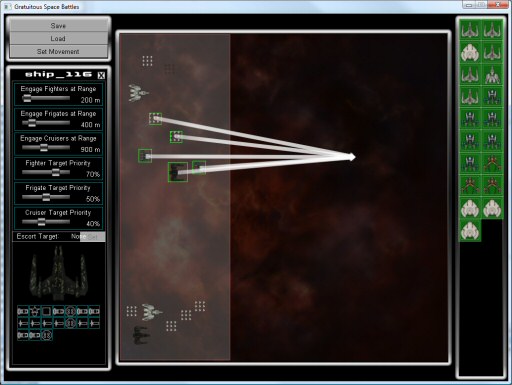Posted on February 24, 2009
I’ve been redoing the deployment screen for the game today. I’m a bit unsure of how this bit should work. basically the flow of the game is this:
- Select Scenario
- Select ships to form a fleet for this battle (with limits)
- Deploy ships in formations and issue basic orders
- Run battle
The deployment screen is basically where you say “The Enterprise should get no closer than 5,000 meters to the enemy cruisers and blast away, while fighter wing 3 protects it, meanwhile bomber squad 2 will charge in and attack the enemy frigates”
So you need to do lots of fiddling. The current interface is shown below (click to enlarge)

The fleet is on the right, you drag them onto the map to position them within your deployment zone (light rectangle). eventually, approx enemy deployments will be shown on the map too. The sliders on the left is where you adjust the rules of engagement for each ship. This is all very fiddly because do I allow you to set multiple waypoints? And do I make the maps bigger so positions are more tactical? if I do, the ship icons will get horribly small on minimum res (1024×768). Do I abandon support for 1024×768? or allow this screen to zoom or scroll?
hmmmmmmmmmm
Posted on February 21, 2009
Jack (my youngest cat) was in fine form today. I opened a bedroom window and he was looking out of it, then decided to leap out and grab the top of the open window with both paws. I don’t think he had planned ahead as he now dangled by both front paws from an open window with no easy escape route. Almost immediately he lost it and fell.
Thankfully he fell maybe 5 feet onto the conservatory roof. and he seemed fine, albeit slightly baffled. I’m sure it’s all in a days work for him. He should concentrate his energy on defending the kitchen from the black and white cat that comes in at night to eat his food (caught him twice). That cat can sniff food through TWO catflaps in an airlock-style setup, so he must be hungry.

Today I’ve tried the worringly slow-loading Empire:Total War demo, and started work on making those fiddly German language characters show up for a potential German-language copy of Democracy 2.
Posted on February 20, 2009
At princecs insistence, I stuck a metric ton of ships into the game and ran it with fraps to see how it managed. Still 70-80fps in release mode before Ive gone optimize happy, so not bad:

Posted on February 17, 2009
I spent part of yesterday and today working on the shield effects for Gratuitous Space Battles. The old effect was shit, but it was only placeholder. It was just a simple alpha blended sprite that draws over the ship, fading in and out as the ships hit like this:

There was a lot wrong with it. firstly lasers seemed to shine through it, secondly there was no feeling that the ship got hit from a certain angle, and there was generally not much pizzaz. The newer version is better but still needs work:

Now I have the incoming laser fire stopped at the right place, plus the shield itself has 2 layers, a feint all over effect, and an angled blast front image which faces the point of impact. I think it looks lots better. What I don’t have yet is any sparks or particles rippling out from the impact point. A simple particle shower is easy, but ideally the particles would ripple around the shield in a realistic spherical sense. I’m not sure how easily doable that si without doing it all in 3D, which is overkill.
Right now I’m working on spaceship breakups on explosions so I’m taking a break from the shields stuff.
Posted on February 15, 2009
I don’t even HAVE an iphone, but I’m lucky enough to have played this:
http://www.ancient-workshop.com/
On someone else’s. It’s excellent. If you are one of those hip trendy kids with an iphone, you owe it to yourself to get it immediately. It’s probably the best new puzzle / thinking game mechanic I’ve seen in ages, and the polish and presentation is just superb.

It’s a puzzle game where you have to get a frog from point A to point B by moving his legs from one water droplet to the next. If you think it sounds straightforward it isn’t.
The guy who made it taught me how to code properly, and he really knows his stuff. Given the quality of this game and the amount of drivel currently on iphone, it’s CRIMINAL that this isn’t yet the #1 selling game on there.
Seriously, give it a go.